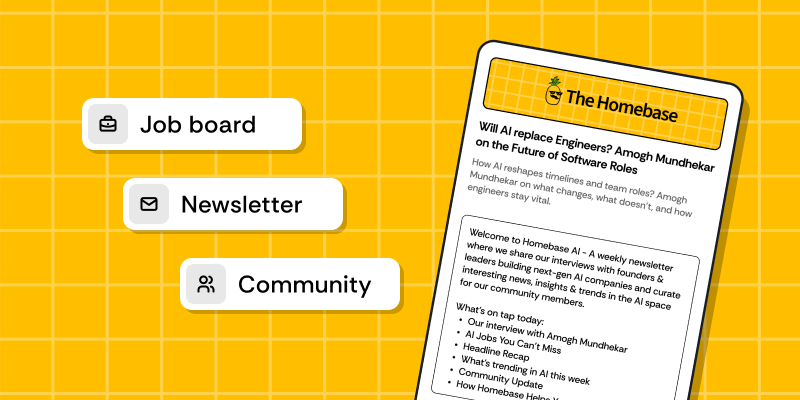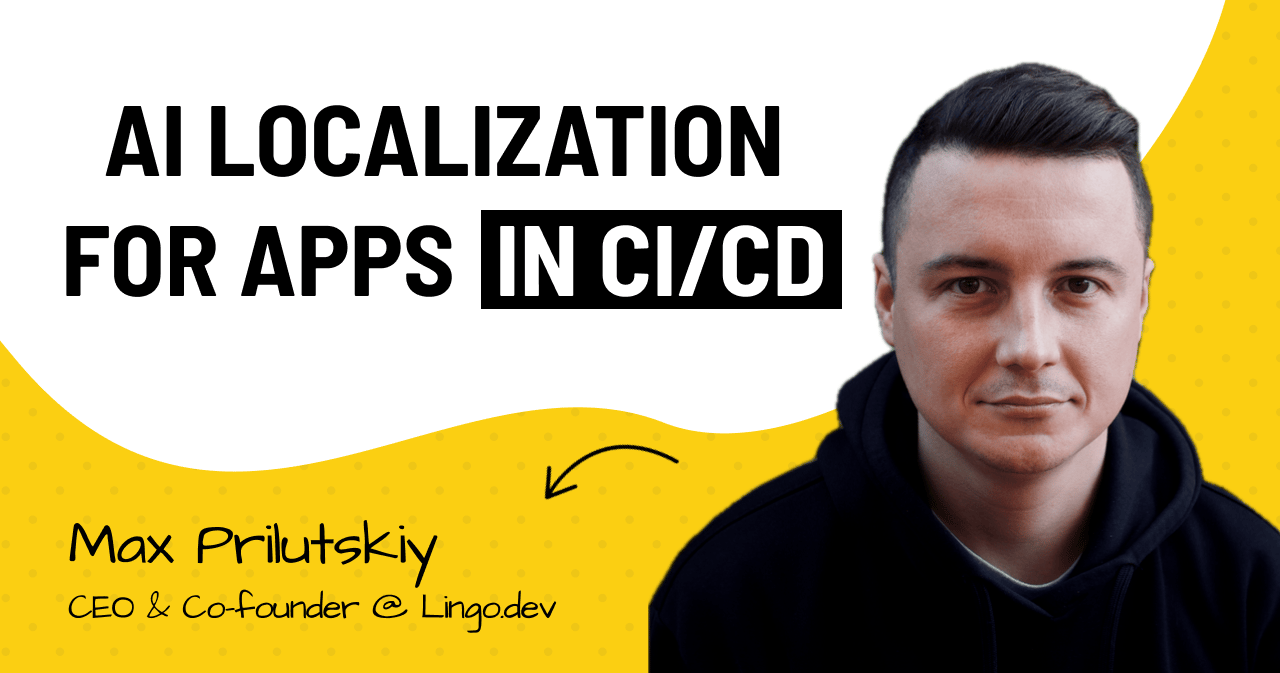Meet Chris Brownridge, who went from a non-technical startup CEO to learning code. He built his technical foundation starting with Google Apps Script, built and sold a business during COVID, then acquired Flixr in 2022. Today, he runs Flixr and an AI consultancy, helping businesses develop their AI technology.
Interviewed by Derek Skinnell and David Stepania for the Homebase podcast.
Key Highlights:
If you only have a few minutes to spare, here's what founders and technical leaders should know about Chris Brownridge's insights on building with AI:
-
Learned to code with Google Apps Script, building a technical foundation from scratch
-
His development philosophy: "Nothing should take six months. Everything we do is get stuff out the door within a month"
-
Built an AI Slack bot that uses SERPA to pull LinkedIn profiles, company domains, and contact information for lead generation
-
70% of his agency's revenue comes from referrals
-
Currently runs both a video agency (Flixr) and an AI consultancy, using service business revenue to fund and test multiple product ideas
-
Found AI excels at data processing but still produces "exaggerated" emails that feel "too AI" despite extensive context
-
Warns about voice AI platforms becoming "scary good," particularly concerning for potential phone scams
-
For LinkedIn growth: screen recordings of browser work outperform traditional video content, driving business opportunities
Could you tell us about your background and current ventures?
I'm a Brit in the USA, moved over here 12 years ago now for a startup in San Francisco. Stayed there for four years moved up to Seattle and raised four and a half million as CEO of a company called Gorkbox, trying to build some influencer tech. Back then, it didn't work out. It closed that down in 2019. Then took a bit of a break, and learned how to code...
Bought a video agency in the summer of 22... That agency creates short-form video content for social media for performance marketers and runs that and also has an AI innovation consultancy. We have a team of engineers. We work with small medium-sized businesses that don't have technical resources internally and really help them develop AI technology that they can own and operate.
What drove your decision to learn coding? And how did you start your journey?
I didn't empathize with the engineering side very much, we were a tech business. I was a non-technical CEO... I don't think it would have necessarily led to a different outcome if I had been technical, but it was definitely something I came out of that experience thinking I wasn't technical, couldn't empathize with the engineers, and couldn't challenge them. If they said this is going to take six months to build, had no clue.
Google Sheets is great. That's actually how I learned to code originally, was Google Apps Script. I took an Apps Script course, which is like some version of JavaScript. And it was like super empowering because you could build anything into a spreadsheet then, which is really cool.
How has your approach to development changed since learning to code?
If someone says to me this week, I'd be like, great, go at it. But as often was the case, it was more like a month, three months, six months... Whereas now, if someone says to me, I have an idea and I push it out there and someone says it's gonna take six months, I can call bullshit on that straight away. Nothing should take six months, in my opinion. Everything we do is get stuff out the door within a month.
What's your philosophy on product development?
If you're learning and you're understanding what the market wants, you're talking to customers, you're putting stuff in front of them, then that leads to revenue. And if you push your stuff in front of them quickly, that leads to revenue coming in the door. If you're not and you're taking ages to do things, you're not communicating with those clients and revenue doesn't come in.
Can you tell us about your fundraising experience?
First round, there wasn't really any revenue. It was based on our history and experience... When we first launched it, we were the first ones to market with this product and it grew real fast, like went from zero to making 10 grand a day in, I would say two weeks... It was probably about a week after we raised the money that it just suddenly fell apart.
Why did you transition to bootstrapping?
For me personally, when you sell a significant portion of your company and you have investors on board, you have a board, there's a paradigm shift in terms of the management of the company... I was CEO, but ultimately answered to the board, and to the investors. And for someone who struggles a little bit with manager authority... I've never had a boss again, something I really struggle with.
How do you approach building in public?
I've become a lot more active in pushing on LinkedIn and Twitter. I feel like I used to be super self-conscious about posting on there. Now I'm just like, you know what, get it out there. It doesn't matter if I get one like on it, I couldn't give a shit. For some, I'll get 100 likes and comments, and it'll lead to business.
What's working well on social media?
What I found on LinkedIn for the listeners and viewers, is that video works really well and it takes like, you don't even have to be in the video, you just take a screen grab of you doing something on your browser and then put it on there. And that, I find, has been the best-performing stuff for me.
What's your customer acquisition strategy?
We test different things out there too because I don't think any one strategy seems to work persistently... We've tried a lot of cold outbound. It's, knows, cold outbound has not been that successful. Yes, we've closed a couple of fairly big deals here or there, so we keep doing it. But we also have a content strategy. We do a podcast as well, focused on creative folks.
How are you using AI in your operations?
We have a Slack bot that we use, like an AI sales assistant... We tag it and say find the contact information with this group of people. It will go do that... And it uses SERPA, if you're familiar with that, it's like a Google search engine API basically. We use SERPA to pull more information, get the LinkedIn profile, get the company domain, and then we use different data providers to get the information.
How do you make your processes efficient with offshore teams?
We have an offshore SDR and we wanted to make the process as simple as possible... We want to strip it back, right? Everybody's familiar with the spreadsheet pretty much. I don't think I've met anybody that can't use a spreadsheet in a long time and all they have to do is paste values into this column it will literally do everything else for you at that point nothing else you need to do." (58:49.695)
"The goal really is just to make it as simple as possible for the offshore SDR so they can run through 50, 100 leads a day and do it in half an hour. It's sort of taking hours and hours to do it, freeing up the time for other valuable things... We don't spend eight hours a day trying to cold email where cold email, the ROI on it, quite frankly, is not great.
How do you approach referral-based growth?
We did come up with a tool to build there as well, understand from our list of closest clients, we took a list of 20 folks, pulled all the LinkedIn connections, and then we went into each of those connections with not at all to do this and scrape their history and look for overlaps... Our hypothesis is that it's much easier for you to introduce somebody who you've worked with in the past than if you haven't.
"Imagine Derek, you worked at Google five years ago and you were there at the same time as David. The chances are you might have a relationship with David and you might feel comfortable referring us versus this other connection, you've got no idea who they are. And so that's what we poked into and we've had a good success with it so far." (54:42.556)
What's your experience with new AI development tools?
Have you used cursor or replied agent?... It's amazing. You can go in and actually give it a detailed prompt of what you want to build, but it will walk through and build it for you and present you with the different stages... Even versus four weeks ago, they launched it four weeks ago maybe. It was kind of janky then. Even now a month later, it's a lot better.
What concerns do you have about AI technology?
Voice is gonna be a problem too. I played with a few voice platforms. They are scary good now... I think I've read already that people are leveraging this technology for sinister means like calling people up and pretending, know, cloning the voice pretending to be a son or daughter that needs a ransom paid... I worry more for my mother, like, you know, is she gonna fall foul to something like that?
How do you see AI evolving for developers?
I lean heavily on AI now. I'm not really doing a huge amount of code writing. It's more debugging and deployment stuff... It's going to get to a place where it can do almost all of what you need to get a simple product up. Now, more complicated things, yeah, it might not get there for a bit. Simple things, rapid prototypes, easy use cases, it does a really good job.
Interview with
Chris Brownridge
Partner @ Nuts & Bolts









